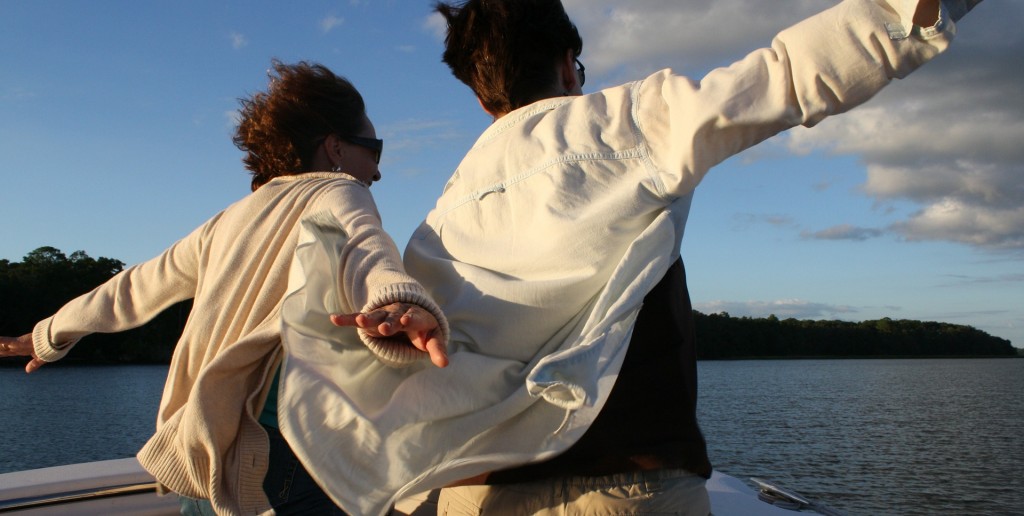The travel insurance industry can be daunting. Find out why people do and do not get travel insurance and how to avoid getting scammed. Then start your search in the right places.
Already think it’s worth it to buy travel insurance?
Good for you! Here’s what I ‘ve used:
- World Nomads: I’ve used these guys for long-term and indefinite travel. Other companies often can’t provide extensions, insure you if your trip has already started, or re-insure you if you’ve let your policy lapse — all options needed on long-term, open-ended trips. Check out the last section below for a $ saving tip with this company!
- Insure My Trip: For more than a decade now, I’ve used this site to insure trips with fixed return dates. They compare policies for you, and the system allows you to cherry-pick your coverage.

Is it necessary to buy travel insurance? It’s rarely required, but it’s almost always a smart move.
Other options:
- True Traveller an option available to UK and European (EEA) residents, an alternative to World Nomads. I hear good things about them.
- Squaremouth: another policy comparison site.
- Travelex and TravelGuard: known for offering primary coverage 1some travel insurance policies will only pay certain types of claims after they’ve tried to get any other insurance (job) in your life to pay first. If you’re going on a fixed trip, this might be a concern of yours.
- STA Travel — students can get the ISIC card, which includes okay insurance + tons of industry discounts. If you didn’t organize your own trip, companies like STA Travel offer coverage for the trips they create.
- Medjet – provides extra evacuation security, which really matters to some. Ensures you’ll be flown to the hospital of your choice back home (vs. flown to the nearest major city to be treated).
- Divers Alert Network — a non-profit with intentions to cover scuba divers, but said to cover any traveler.
- IMG — the only American alternative to World Nomads that I’ve heard of — double check ability to extend, activities covered, length of trip allowed. I’ve been coming across a slate of negative reviews on forums recently that make me wary. But every company has bad reviews, and all policies have sneaky loopholes.
Is Travel Insurance Worth It?
What is Travel Insurance?
Travel insurance is meant to protect you should anything out-of-the-ordinary happen to you while traveling. It doesn’t cover routine or preventative care, but it does cover unexpected illness and accidents. And there’s more!
It can also cover non-medical things that happen, like:
- trip cancellation and/or interruption
- baggage loss
- delays (baggage or travel)
- evacuation

Do these folks have travel insurance? Carefree = probably! Is it necessary to buy travel insurance? That’s up to you! photo pixabay
The more it covers, the more expensive it is. How much? A good policy that won’t leave you stranded on a technicality can be at least $1,000 a year. That’s not a typo. Shorter, less adventurous trips can be far cheaper to insure.
Insurance policies are full of fine print & loopholes that range from disheartening to heartbreaking, so get educated before you buy!

A “loupe” was a slit-opening in 15th century wall. Tiny little places where things can squeeze through. If you buy policy with too many loopholes, then is travel insurance worth it? Probably not – you’d be wasting your money. It sucks that you have to read the fine print! photo: pixabay
Is travel insurance worth it? It sure can be! I’ve only used two of the dozens of policies I’ve purchased – for a Cambodian hospitalization and for unexpected reasons in Honduras. But those two uses were worth over a thousand dollars. I’ve gotten very lucky the times I didn’t have insurance and I busted my ear drum and then my ankle or needed routine medical care not covered by travel insurance. I’m pretty close to breaking even in the travel insurance world.
Is it Necessary to Buy Travel Insurance?
Not sure you want to buy travel insurance? I hear you! It’s rarely required, so technically it is not necessary. From a young age I felt like travel insurance was mostly a huge racket, expensive, mind-boggling to acquire, and anywhere from painful to enraging to actually use. Tragic tales abound of not being able to claim because of technicality. However, there are also many, many relieved people whose travel insurance really saved their skin. The horror stories from people who didn’t have insurance will make you think twice.
Arguments people (like me!) use to talk themselves out of travel insurance:
- I can’t afford it. — The most common response to this is: “If you can’t afford insurance, you can’t afford to travel.” I find that statement highly annoying and exclusionary. More accurate: if you can’t afford insurance but are going to travel anyway, you’re gambling the rest of your life and the financial lives of your loved ones. Up to you!

When you have empty pockets, it’s harder to decide, “is travel insurance worth it?” Maybe you can’t afford it. But can you afford risking your life and the financial lives of your loved ones? Maybe. photo: pixabay
- I’m healthy. — Yes, of course you are! That’s why the insurance isn’t even more expensive. But travel insurance has little to do with your health. It’s about the things that can go wrong that cost you your health or put a major dent in your financial life. When I used my travel insurance in Honduras, it wasn’t for health reasons.

Health insurance? I eat heath insurance for breakfast. I’m not paying for that crap! I’ve never use it. I’m healthy as a horse! Wait, what? It can also cover my laptop being stolen from my hotel room? And my flights to rush home if my mom gets in a car accident? Hmmm… photo: pixabay
- I already have health insurance. – There’s a slim-to-none chance your current policy will cover you once you leave your country of residence.
- It’s not worth it. There’s too much stuff they don’t cover. — It’s true that the policies that cover your arms and legs no matter what activity you’re partaking in, also cost an arm and a leg. Conventional wisdom: do right by your next of kin by at least getting solid medical coverage and repatriation of remains 2aka they’ll pay to fly your dead body home. Then educate yourself about sneaky fine print and claims processes.
- The companies never pay claims anyway. — That’s not true. My Cambodian hospitalization was 100% covered by my travel insurance because I read the fine print. Same for my Honduras trip that got interrupted for unexpected reasons. Insurance companies are professionals at their own game. To avoid becoming another internet sob story, become an expert on all the loopholes you’re agreeing to when you buy your policy.

Loopholes used to be tiny “loupes” in castle walls. Now they’re reasons some people
answer “no” to “is travel health insurance worth it?” photo: pixabay
- I’m willing to take the risk. — Me, too sometimes. Again, remember: you’re not just risking your own life and financial future, but also the financial lives of your loved ones. Unless you know your next of kin would happily leave you for dead if you exhaust your own means, remember that you’re making a decision for them, too. Or perhaps your next of kin have even less money than you do. In which case you’re risking that they could be stuck facing the tragedy of being helpless to come to the aid of someone they love. Pretty intense.
- If something happens to me, I’ll just pay out of pocket. — Me, too. I’ve done this before. I busted my ear drum in the Philippines doing a non-covered activity (just had a basic policy) and paid out of pocket. Same for my busted ankle, and all my routine medical care on the road. One tactic is to put aside the money you would have used to buy a policy, and use it only if something goes wrong. As long as you don’t break both your legs while hiking in the Andes and need a $45,000 airlift to a hospital, or get hit (and run!) by a car in Australia or Sweden, the out-of-pocket approach could work. Then again, you could find yourself in over your head for medical expenses and end up dragging your family down with you. Or out a bunch of money when you have to buy emergency flights and come racing home to a family member.
Okay, fine. I guess travel insurance is worth it.
What do I do?
→ If you can stomach the cost of comprehensive, open-ended insurance:
Great! Look at top coverage offered by companies like World Nomads or True Traveller (UK and EEA residents only). These policies are easy to understand, quick to obtain, and give you all the peace of mind you’re ever going to get from an insurance company. Consider getting insurance as soon as you’ve purchased your first flight. It doesn’t cost anything extra, but it increases your chances of being covered if a tragedy cancels your trip.
→ If you’re determined to pay as little as possible:
Good on you for not risking your life and/or the financial futures of your loved ones. But get ready for an education!
-
- Going open-ended?
You probably still need something like World Nomads or True Traveller 3True Traveller is available to UK and EEA citizens only. If you’re looking at cheaper option, remember to check for sometimes not covered things… like snorkeling, cave tours, jumping off the cliffs into the ocean with your new friends, going up in the plane of that millionaire you hosted in your rented apartment in Croatia, etc.True Traveller (for UK and EEA citizens only) has add-on “adventure” packs to augment their basic cover.Both companies will let you extend as needed, so you only have to buy coverage for as far out as you know your travel plans. Extending online was really easy for me. And if you accidentally let your coverage lapse, it’s no big deal with them. Buy as soon as you book your first big flight to be in a position to take advantage of the trip cancellation insurance.I saved money with World Nomads by booking in full-month blocks. When my trip fell just short of an additional full month (e.g. 2 months and 27 days, 7 months and 22 days), entering dates that got me over the full-month mark often resulted in a drop in price. (The more months you buy, the cheaper a policy gets.) Reader Jason says you can save a couple hundred bucks if you just buy your World Nomad policies 6 months at a time. It’s worth getting quotes based on different time frames to see if he’s right.
- Going open-ended?
- Have a fixed return date?
Can I talk you out of your fixed plans? If not, I use Insure My Trip to compare policies. They’ve been my go-to for over ten years. Prepare to invest a lot of time understanding each area of coverage, deciding whether or not you need it, agonizing over coverage that might be worth it for another $20, checking to see if your homeowner’s or renter’s insurance might already cover it, checking to see if your credit card might already provide coverage, and reading the disappointing fine print on a gazillion different policies. If you decide on a plan with trip cancellation insurance, buy as soon as you book your first big flight to take the most advantage. …unless you’re anticipating a hurricane like I was in Honduras. 4I struggled to find a policy that even covered hurricanes, and those that did only did so if the policy was bought within a few weeks of the trip and BEFORE the trip-impacting hurricane was named (making it an official storm).
Don’t forget to educate yourself about fine print and become an expert on your policy!

It sucks that you have to pull out the microscope to be sure your travel insurance policy is worth it. Them’s the breaks! photo: pixabay
Final Words:
It would by hypocritical of me to tell you you have to get travel insurance. For the last ten years 70% of the time I’ve been insurance free 5sorry Mom & Dad!. Other times I bought policies thanks to bursts of responsibility or country entrance requirements. 6a working holiday in New Zealand, etc. When I had no policy or a policy that didn’t cover my misfortunes, I paid out of pocket. I have one two, glorious stories – one in Cambodia, the other in Honduras, when I had a need for medical care and insurance that would cover it at the same time!
Update 2018: Do I Still Hate Travel Insurance?
It’s up to you if you want to tempt fate. Maybe you’ll be fine. For sure going without it is a pretty huge gamble.
More info: Travel Insurance 201: Don’t Get Duped.
Tempted to opt out of insurance to save money? These travel hacks are better ways to save:
- Free Flights
- How to Sleep for Free When You Travel
- Cheap Flight Hacks
- How to Get a Free Backstage Cultural Pass
- How to Become a House Sitter
- 24 Jobs To Do While Traveling the World
Happy Traveling! ♣
References
| ↑1 | some travel insurance policies will only pay certain types of claims after they’ve tried to get any other insurance (job) in your life to pay first. If you’re going on a fixed trip, this might be a concern of yours. |
|---|---|
| ↑2 | aka they’ll pay to fly your dead body home |
| ↑3 | True Traveller is available to UK and EEA citizens only |
| ↑4 | I struggled to find a policy that even covered hurricanes, and those that did only did so if the policy was bought within a few weeks of the trip and BEFORE the trip-impacting hurricane was named (making it an official storm). |
| ↑5 | sorry Mom & Dad! |
| ↑6 | a working holiday in New Zealand, etc. |




Twitter Facebook Google+ StumbleUpon Reddit Pinterest